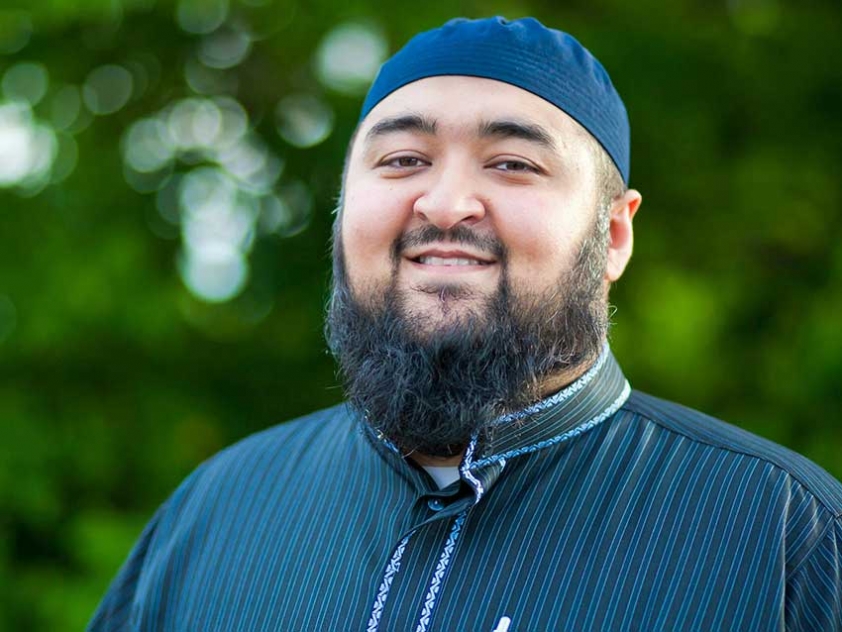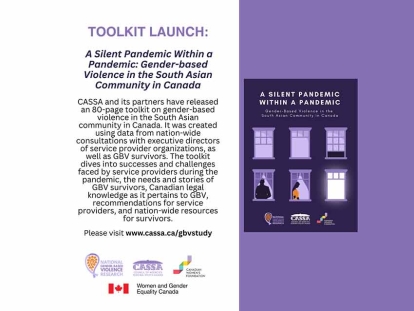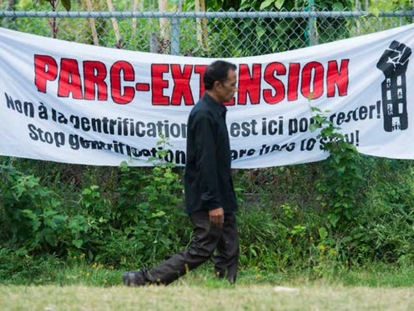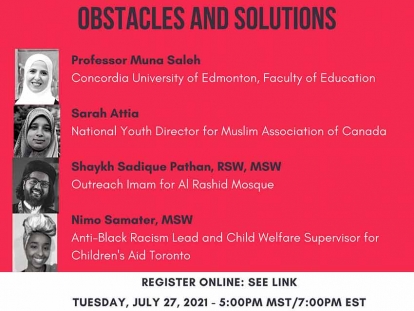 Navaid Aziz was born and raised in Montreal and now serves as an imam in Calgary
Courtesy of Navaid Aziz
Navaid Aziz was born and raised in Montreal and now serves as an imam in Calgary
Courtesy of Navaid Aziz
Mar
Navaid Aziz: Empowering Youth and Countering Extremism
Written by Chelby DaigleBorn and raised in Montreal, Indo-Pakistani Canadian Navaid Aziz, 33, stumbled upon a vocation as an Islamic scholar when he was accepted to the Islamic University of Madinah in Saudi Arabia at 17. Now an imam in Calgary, Aziz will be coming to Ottawa’s I.LEAD Conference to discuss youth empowerment, countering radicalization in Muslim communities, and creating a balanced and just Muslim community.
What will you be discussing at the I.LEAD Conference?
I’ve been assigned three topics. The main lecture I’ve been given is reflections on the verse in Surah Al Baqarah where Allah says we have created you as a just and balanced nation. Then I’m doing two joint panel discussions, one on youth empowerment with Boonaa Mohamed and the second one is on radicalization in the Muslim community.
How did you decide that you wanted to become an Islamic scholar?
I believe that Allah chose this path for me. I was 16 when I decided to learn more about my faith and become practicing, praying five times a day. I eventually started learning the Arabic language. It took me about an hour and a half bus ride from South Shore to St. Laurent each way to get to Arabic class every weekend. I eventually found a brother who was like “Look, just show up to class and I’ll drop you home.” Then one day, as we were on our way back from Arabic class, this brother wanted to stop at this masjid (mosque) because there were professors there from the University of Madinah and he wanted to apply to study there. I had no idea what that university was so I was just going to wait in the car. But he invited me to wait instead in the masjid. As soon as I entered the masjid there was a guy with a clipboard and he took my name down. This guy starts calling out names like it’s a roll call and I’m one of the first to get called because it was in alphabetically order. And the gentlemen inside the office starts asking me a whole bunch of random questions from theology to jurisprudence from hadith to Quran and I couldn’t understand what was going on, like why was he asking me these questions, until at the end of our discussion, he was like “Give me four pictures” and I was like “Why do you need four pictures?” And then he explains that this was the interview for the Islamic University of Madinah. Then I’m like “I don’t want to apply to the University of Madinah.” And he was like “Look, you just finished the interview so just give me the pictures and see what happens.” So, I went down to the local Metro Station, found a photo booth, put in a toonie, got four pictures from the machine, and came back and gave him my pictures. So, by the grace of Allah, out of the 65 people that applied I was the only one who got accepted. I was 17 about to turn 18 at the time. My parents were not happy at first. At that time, I was in CEGEP (The Later Years of High School in Quebec) and I had a scholarship to study Management Information Systems at Concordia University. They went through a whole cycle of emotion from absolute rejection to like “This is what you have to do and there is no backing out of it!” I had some turmoil in myself about what I should do. Finally my parents were like, just go try out the Arabic Institute and if you don’t like it then at the very least you have learned a new language and you don’t have to continue any further. After my first year in Madinah, I never turned back.
What expertise will you be bringing to your reflection on Surah Al Baqarah?
My main background is in Islamic Law. I studied Islamic Law at the University of Madinah. Our curriculum was doing a detailed exegesis of the Quran, particularly the first ten chapters of it. So my main lecture will be reflecting on how our predecessors, from the companions on the Prophet (pbuh), understood the concept of being a just and balanced nation and what that actually means in a real world context. How are Muslims meant to be balanced between this life and the next life? How are Muslims meant to be balanced between living in the mosque 24/7 as opposed to not going to the mosque at all?
You will be co-facilitating a workshop on Youth Empowerment. Why do you think this is an important topic in a Canadian context?
My topic of discussion will be creating a Muslim identity that youth can be proud of and what a Muslim youth needs to be successful in this life and the next. One of the challenges is that the mainstream community is a lot more accommodating to youth and a lot more willing to accept people as they are as opposed to wanting them to change for our own desired agendas. But what I would add to that is we have a huge problem in the Muslim community when it comes to religious authority and religious leadership. What I mean by that is that we have created a bubble or a vacuum in our mosques and religious organizations where we import imams who may have a background in Islamic Law but they can’t relate to the people, particularly the youth. There is a social gap, a culture gap, a relevancy gap that isn’t being filled for them. So when the youth are looking for acknowledgement and religious knowledge, they are not finding it from their imams because their imams just can’t relate to them. Part of my discussion will be that if you can’t find it you need to create it for yourself. That’s the importance of youth seeking Islamic knowledge so that they are not dependent on other people to get that knowledge.
Here in Ottawa and in your city Calgary, youth have left to fight with ISIS, which is raising a lot of questions about why Canadian youth are being drawn to such a group. What are your thoughts on this?
Allah tells us very clearly in the Quran that we were created to worship him. That’s the lens through which we see the world, so everything we are meant to be doing is meant to be some sort of act of worship. And a lot of times when, tying this into ISIS, when people don’t find meaning in life, they start to look for meaning in death. That’s what happens with people who join ISIS, they are no longer interested in living a fulfilling life, they are like “Let me find a fulfilling death instead”. When many people go off to ISIS, they go with the intention of never coming back; they go with the intention to die. So part of my discussion with youth will be about what can be done to find a fulfilling and meaningful life before you attain that meaningful death.
A lot of times when you are young, you create a binary narrative; it is either my way or the highway. You look at the world in Black and White. Whereas, when you grow older, you get to see that Black and White have a whole Grey spectrum in between them.
In terms of why this happens, it could be due to lack of experience, lack of wisdom, lack of religious knowledge. A lot of times people just feel marginalized, they don’t feel accepted, they don’t feel recognized, so that’s what compels them to join these groups that are willing to accept them as they are, who they are.
There is this really nice quote that Imam Zaid Shakir posted on his Facebook Page like a year or two years ago. He said “Come to Islam As You Are To Islam As It Is” meaning that you should not want to try to change Islam, nor should you have to change yourself drastically before coming to Islam because Islam is a process that will change you to become a better person. That is why if you look at a narration of the Prophet (pbuh) He said the best of you in Jahili (the time before the revelation of Islam) will be the best of you in Islam as long as you have a good understanding of your faith. So Islam didn’t come to change people, it came to complement people and improve them and take the good of every culture and improve it. But unfortunately, a lot of people don’t view it like that.
Here in Ottawa we had an event called The “J” Word about Jihad and Extremism. One of the things that came out of that discussion was youth expressing that they saw local imams as “weak” and conforming to Canadian society. They said that they preferred online religious scholars because they gave much more straightforward answers without any nuance or shades of grey and they felt that those scholars were “braver” than the imams in Canada. Have you heard anything like this before?
All the time. We have this call to religious authority but we often don’t look at the person’s arguments we look at the personality behind those arguments. So people call to authority when they don’t have an argument to stand on. So we’ve created this Superman Imam/Sheikh persona so that if you want to be a credible sheikh than you should have went to prison at some time in your life, you should have criticized some government or gone through some torture process and that’s how you have earned your armour of credibility. Obviously this is very very far fetched from what reality actually is. I completely disagree with this narrative. At the end of the day, what is of substance is knowledge and action, not criticising certain movements or groups and not following the law of the land that we live in.
Given what you have seen the Muslim community in Calgary go through in the wake of so many youth leaving to join ISIS, what lessons can you share on how Ottawa’s Muslim community can support each other through this time of crisis and not be divided by it?
When it comes to not being divided, we need to keep in mind an Arabic proverb about the three bulls. It has a famous tagline “I was eaten the day that the White Bull was eaten.” Here’s the story. You have a Red Bull, a Black Bull, and a White Bull. A lion tries to attack them every so often but the lion is unsuccessful because the three bulls are united. Until eventually the lion becomes clever one day and he speaks to the Red Bull and the Black Bull and says “I promise to leave you alone if you let me eat the White Bull.” The Red Bull and the Black Bull agree and the lion devours the White Bull. Then the lion gets hungry again, he goes to Black Bull and he says “I promise to leave you alone, just let me eat the Red Bull”. The Black Bull agrees and the Red Bull is eaten. Then the lion comes back and is going to eat the Black Bull. So the Black Bull says to him “I was eaten the day that the White Bull was eaten.” This means that the day that we start throwing our own members of the community under the bus and we don’t stand up for them and we don’t support them, that is the day we shoot ourselves in the foot. Rather than throwing people under the bus, we need to create dialogue, we need to create discussion, we need to create a memorandum of understanding stating that we will learn to work together and not blame one another for this crisis. Regardless of what your denomination of Islam is, what methodology you follow, the average non-Muslim is not going to differentiate between Sunni and Shia, Sufi or Salafi or any other kind of Muslim there is. If there is an attack on the Muslim community all Muslims are affected regardless of denomination. You need to get your head out of the sand and understand that this is a problem for anyone to attributes themselves to Islam. You can’t keep blaming others. Accept responsibility and own it and let’s see what we can do together to solve the problem.
Another issue is that sometimes when young people start trying to really get into the faith they go straight to figh (Islamic law)? Do you think there is a natural order to how you should pace yourself when studying Islam?
I agree definitely. I believe this is why the Quran was revealed over a period of 23 years and it actually has a chronology to it. If you look at the first 13 years of revelation, it is about building faith, it is about understanding who God is, it is about understanding what paradise and hellfire is about, it is about understanding what the virtues and vices that Islam has come to ordain or prohibit. Then the next ten years is when it explores jurisprudence and fiqh related matters. So, it is important for people to understand first the basis of theology and what it means to increase faith and follow that by good character and then go on into jurisprudence. You need to learn the basis of your faith, follow that up with what you need to protect your faith, follow that up with building good character, then study jurisprudence. Just having jurisprudence will not save you, it will not protect your faith. The jurisprudence comes to help perfect your faith, not to establish it.
Do you feel it is important for more Muslim organizations to work in collaboration to create events like the I.LEAD Conference in order to more effectively build community between Muslims in Canadian cities?
One of the fundamental objectives of Islamic law is to unite the people. A lot of people think that unity is about conformity of thought. Unity is not conformity of thought, unity is conformity of the heart where we understand that we each are different in our understandings, in our orientations, in our ideologies, in our methodologies, but at the end of the day, we worship one God and we follow one Prophet and we are serving one humanity. That is why their needs to be certain projects that regardless of where we are in the spectrum of Islam we work towards that greater good and show solidarity and show unity.
But there are so many challenges to this, starting off with personal egos to finances to “I want to push my own agenda versus you want to push your agenda.” But at the end of the day, part of our Muslim character is learning to sacrifice what can be sacrificed and what should be sacrificed for the greater good. When you are trying to bring the community together, a lot of the time, you will need to put your ego aside, you will need to learn to sacrifice some of your finances, and even to put your agenda aside for the sake of the greater good.
To learn more about Imam Navaid Aziz follow his Facebook Page or Twitter Page
This article was produced exclusively for Muslim Link and should not be copied without prior permission from the site. For permission, please write to info@muslimlink.ca.















